
“That misguided woman!”
That’s how John D Rockefeller described Ida Minerva Tarbell. Their relationship was strained, bordering on mutual obsession, although they never actually met. Yet their confrontational standoff reverberates to this day. Just as it should.
The world’s first billionaire, Rockefeller was the business genius who, in the late nineteenth century, came to dominate America’s early oil industry. A struggling journalist from small-town Pennsylvania, Tarbell was the spinster who, after painstaking research and showing enormous courage, exposed Rockefeller’s illegal methods, bringing the oil titan to heel.
Understand Rockefeller versus Tarbell and you’ll understand the importance of a free press – and, in particular, investigative business journalism. Understand Rockefeller versus Tarbell and you’ll understand the colliding forces that must be balanced to make a capitalist society work.
Our story begins at ‘Oildorado’
The global oil industry today generates revenues of over $1,000bn a year. Extracting and marketing hydrocarbons is, by far, the world’s biggest industry. It all began, though, in 1859, in a forest to the west of the Appalachians, on what was then the God-fearing American frontier. An eccentric backwoodsman called Edwin Drake had been told the thick, smelly discharge sometimes found on forest floors in Pennsylvania might be usable in whale-oil lamps. So he rigged up a steam turbine and started boring a hole, just outside a small town called Titusville. After a year of trying, Drake finally struck black gold, sparking a drilling frenzy. “Oildorado” saw farms upended and virgin forest stripped. A slow-paced, agrarian community became a chaotic, money-making free for all.
When Drake discovered oil, Ida Tarbell was two years old – her family living close by. Growing up amidst the depravity and destruction of this oil bonanza, she buried herself in books. The young Tarbell, though, her later writings show, was alive to the mud, the lawlessness, the forests of wooden-drilling derricks. Oil changed everything in Titusville, bringing big characters, chancers and new technologies to a town transformed by crude.
As capital poured in, an oil industry of sorts began to emerge. A young book-keeper-turned-businessman, Rockefeller built a small refinery in nearby Cleveland, Ohio, turning oil into usable fuel. His operation – Standard Oil – was ruthlessly efficient, and began taking over competitors. By the start of the 1870s, just a decade after Drake’s discovery, Cleveland was America’s oil refining hub, with Standard controlling 10% of US refining capacity.
Appalled by disorder and inefficiency, Rockefeller took America’s wildcat oil industry by the scruff of the neck. Bringing together production, refining, transport and marketing, he invented what was then called a “combination” – the vertical-integrated modern corporation. “The day of the combination is here to stay,” Rockefeller boomed, as Standard moved to corner the market. “Individualism has gone, never to return”.
For many, Rockefeller’s sentiment went against what it meant to be American. This young country, after all, had been built by brave souls hacking a living out of the wilderness, standing on their own two feet. Admired by some, Rockefeller was more widely resented – most intensely by small, independent oil producers. That resentment turned to anger, when rumours swirled that Standard was in cahoots with Eastern America’s railroads.
Before pipelines and trucks, the only way to get large volumes of oil from Pennsylvania to the coast, and wider domestic and international markets, was by rail. While uniform freight charges for oil barrels were supposed to apply, stories emerged of Rockefeller using his market power to secure prohibited “rebates” – lower prices to carry his crude in return for giving competing railroads guaranteed volumes. There was also dark talk of “drawback” deals between Rockefeller and rail tycoons like Cornelius Vanderbilt and Jay Gould. These clandestine contracts were said to channel payments from the railroad companies back to Standard, funded by freight price rises that damaged Rockefeller’s rivals.
During the ‘oil wars’ smaller businesses attacked the railroad companies for colluding with Standard Oil
Outraged by collusion between Standard and the railroads, independent producers rioted and attacked rail terminals. Throughout the 1870s, as a teenage Tarbell watched, the “oil wars” played out on the streets of Titusville and other towns across America’s oil region. She had a ringside seat. Tarbell’s father, an oil-barrel maker turned small-time driller, helped to organise “the independents”.
When proof emerged of Standard’s secret “sweetheart deals” with the railroads, Rockefeller was unapologetic, greasing palms, seeing off legal threats and dismissing the regional press. “It is not the business of the public to change our private contracts,” he told one frontier journalist. “It is easy to write newspaper articles, but we have other business”.
By the early 1880s, the oil wars had passed and most of the independents had gone bust or sold out to Rockefeller. This was America’s “Gilded Age”, an era when “the Trusts” – huge monopolistic businesses, run by “Robber Barons” – dominated industries such as copper, sugar, iron and steel. Standard Oil – depicted in coruscating newspaper cartoons as “the Octopus” (below) – was the most notorious. By 1890, Standard and its affiliates controlled no less than 90% of the US oil industry.
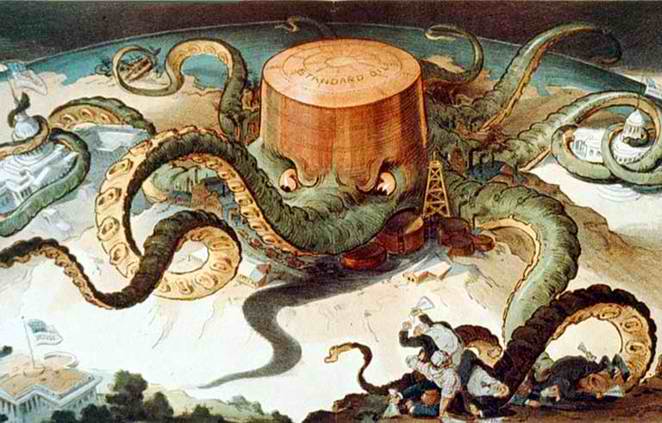
By this stage, Tarbell had become a journalist. Having decided never to marry, she devoted her life to writing and research. Her articles – heavily fact-based, yet lively – caught the eye of Sam McClure, a self-made publisher who had come to America from rural Ireland. McClure was starting a magazine, he told Tarbell, to “explain complex events to the masses”.
The McClure-Tarbell partnership is one of the most important in the history of journalism. They built McClures Magazine into a powerhouse of investigative exposes, determined to reveal the lawlessness and corruption of early American capitalism, bludgeoning readers with facts. At the turn of the century, they turned their sights on “the Trusts” and, inevitably on Standard Oil. Tarbell, now a nationally known journalist, had a chance to harness her frontier experience.
What followed can only be described as a journalistic onslaught. Tarbell threw herself into her research, tracking down interviews and documents. She infiltrated Standard at the highest level, charming one of the directors, introduced by her up-and-coming novelist friend, Mark Twain. Over two years, in monthly installments for McClures, Tarbell exposed illegal activity with Standard Oil beyond doubt – including continued collusion with the railroads and corporate espionage. While Rockefeller called her “misguided”, the American public was, at once, transfixed and outraged. Teddy Roosevelt had no choice and he became the “trust-busting” President.
The Supreme Court ruled that Standard Oil be broken up. Some of the resulting companies – such as Chevron and Esso (a phonetic spelling of Standard Oil’s initials) – are still with us today. As America transformed itself from an agricultural outpost into the world’s mightiest economy, this Supreme Court decision sent out a message – capitalism works, but there are limits. “She did it,” says Paula Treckell, a US historian who for thirty years taught at Allegheny College, Tarbell’s alma mater. “A middle-aged woman from Western Pennsylvania – she did it”.
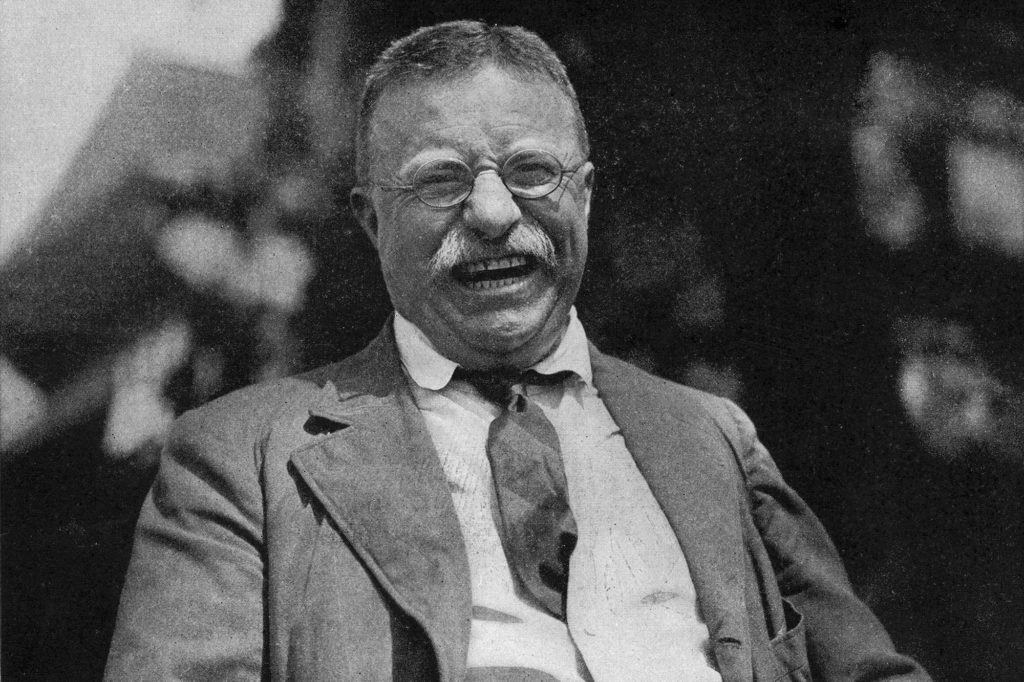
Ida Tarbell is not as celebrated as she should be. I came across her by accident in the mid-1990s – while reading The Prize, Daniel Yergin’s epic history of the global oil industry – and have researched her life ever since. I find her example incredibly inspiring. So it is a pleasure for me to embark on this weekly “Tarbell” column for UnHerd.
Tarbell’s writing, on Standard Oil and a host of other topics, told the truth about early American capitalism. Her frontier spirit and deep intelligence meant she admired business and enterprise, but as long as it was done right. Of Standard Oil she wrote:
“I was willing they should combine and grow as big and rich as they could, but only by legitimate means… but they had never played fair and that ruined their greatness for me”.
Rooting-out and exposing wrongdoing, refusing to be cowed – what Tarbell did so superbly, and what business journalists should always do – is a vital part of this process. Yet today, we’re at a crossroads, with journalism failing and capitalism’s exploitative tendencies, while always with us, becoming ever more prominent. “Big oil”, “big pharma”, “big food” and now “big tech” – these phrases are journalistic slang for the mighty corporations which, yes, provide so much, but which need to be constantly questioned and monitored. Something I’m looking forward to doing with Charlie Pickles, the editor of UnHerd’s capitalism track.
To probe in this way is not to undermine capitalism or to be “radical” or “extreme”. It is to grasp that capitalism, if it is to work well, requires a balance between untrammelled energy and reflection, between determination and decency, between soaring ambition and restraint. Tarbell understood that implicitly. It is vital that we do as well.
SOME FURTHER READING
> On UnHerd today, read Charlotte Pickles’ piece on how the tech giants of today have some resemblance to the anti-competitive industries of Ida Tarbell’s time.
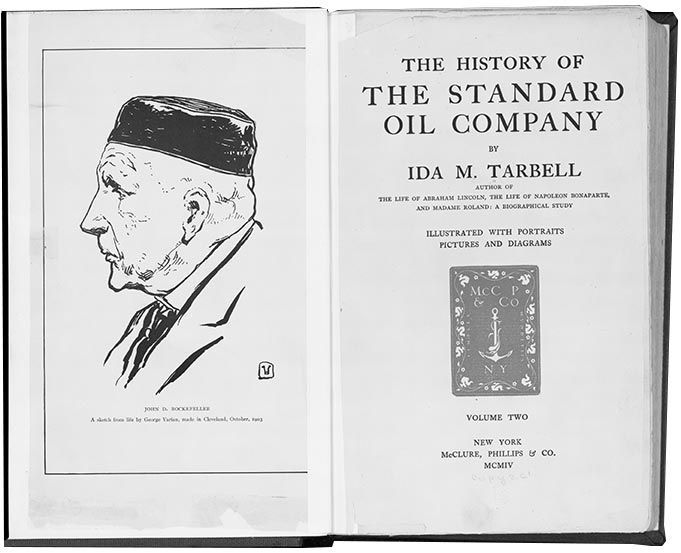
Read the text of Ida Tarbell’s history of Standard Oil (original above).
A profile of Tarbell on Smithsonian.com.
The website of the Drake Well Museum – remembering where America’s oil industry began.
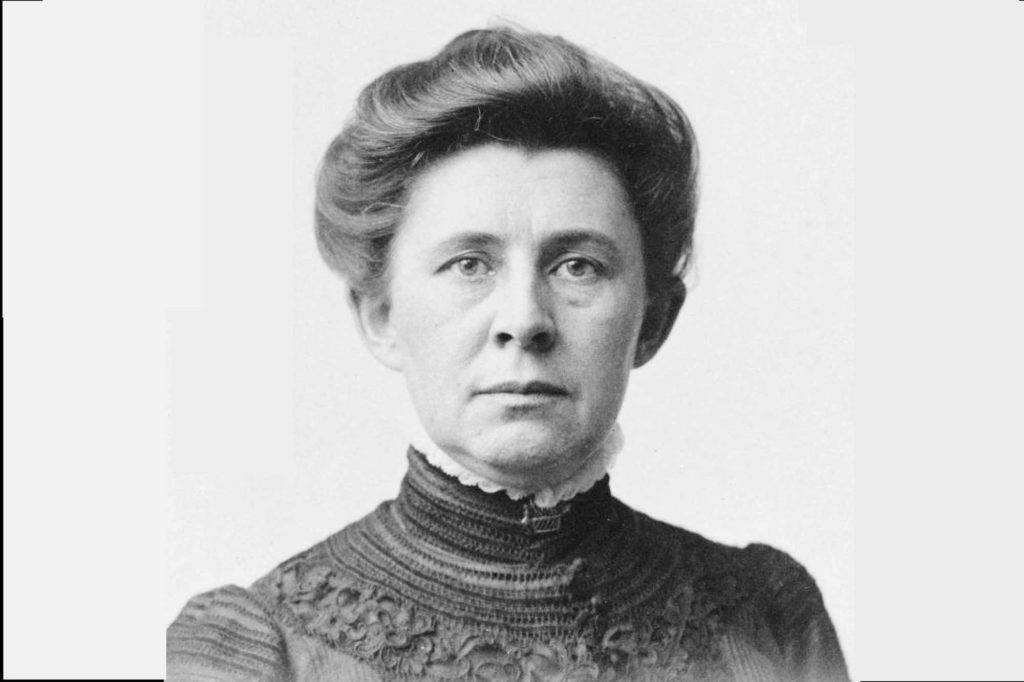





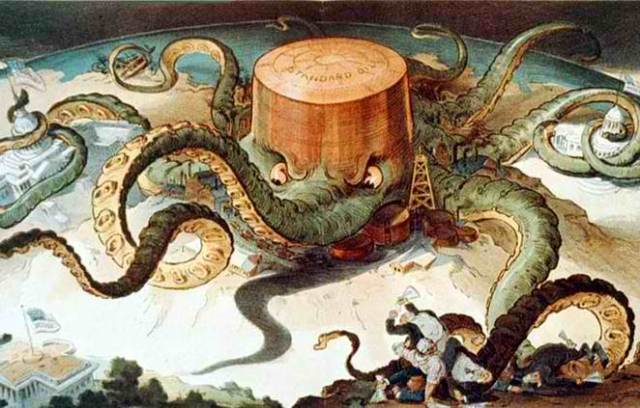




Join the discussion
Join like minded readers that support our journalism by becoming a paid subscriber
To join the discussion in the comments, become a paid subscriber.
Join like minded readers that support our journalism, read unlimited articles and enjoy other subscriber-only benefits.
Subscribe